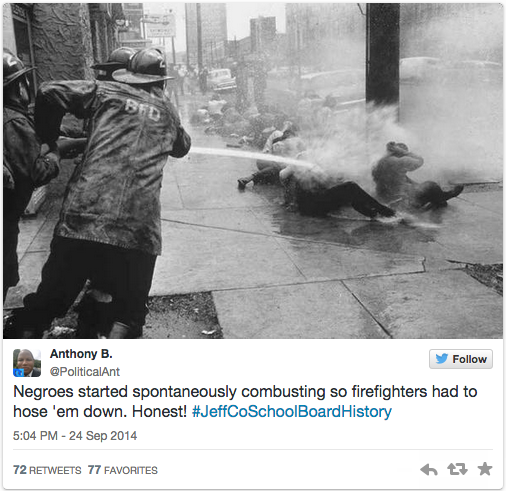
High school students in suburban Denver are staging protests in response to two major changes proposed by their school board. The first, which has already been adopted, is a pay-grade system that ties teacher salaries to performance reviews. The second is still being considered, but it's far more controversial: It would modify the AP US History curriculum to, in essence, teach a more right-wing-friendly vision of America’s past.
"Materials should promote citizenship, patriotism, essentials, and benefits of the free enterprise system, respect for authority, and respect for individual rights,” reads the history proposal, presented by newly elected conservative board member Julie Williams. “Materials should not encourage or condone civil disorder, social strife, or disregard of the law. Instructional materials should present positive aspects of the United States and its heritage."
Ironically, the proposal itself has inspired a great deal of civil disorder. While this evolved into a student-led protest last week, the momentum began building a week beforehand, when 50 district teachers held a “sickout" that forced the closure of two district schools. Then, last Monday, 100 students from Evergreen High School staged a walkout, which inspired kids from other schools to follow suit the next day. By midweek, around 700 students filled the sidewalks outside Jefferson County's Chatfield High School.
“We’re not going to listen to empty promises and be influenced as easily as they think teenagers are,” said Scott Romano, a junior at Chatfield High School who helped organize Wednesday’s protest through Facebook. Romano told me he’s concerned about how these changes will affect future academic prospects for Jefferson County students.
“We don’t want national colleges to look at Jefferson County, Colorado, and say, ‘Oh, you passed the AP exam in Jefferson County? Well, that doesn’t mean the same thing as passing the AP exam in other districts,'" he added.
He's got a point. As Tony Robinson, chair of the University of Colorado at Denver’s political science department, put it, the new curriculum is destructive and will lead to “historical illiteracy" for students.
“They’ll be ignorant to the facts, but they’ll also be ignorant to civic consciousness,” Robinson told me. “There are a good deal of studies that show this kind of ‘patriotism education’ is associated with xenophobia, jingoism, and authoritarian personalities. And when those youth actually confront the reality of their country’s history, there’s a shocking moment of disillusionment and radicalization.”
These protests in Jefferson County coincide with the 50th anniversary of the Berkeley Free Speech Movement protests of 1964 (almost to the day). Back then, certain journalists insisted that there must be some adults behind the impressive and organized force of the movement (leading protester Jack Weinberg to coin the phrase, “We don’t trust anyone over 30”). Similarly, the student protesters have been met with condescension from both local media—who often frame the story as kids merely skipping school—and members of the school board.
Board chairman Ken Witt believes that it’s the teachers—who are naturally upset with the potential pitfalls contained in the coming salary overhaul—who are behind the student walkouts. While he concedes the kids are sincere, he insists they’re misinformed, citing a conversation he witnessed on one school website where students believed that the budget had been cut by $40 million and that US slavery was being excised from history texts.
“Those are both patently untrue,” he told me. “We actually increased the budget, have given teachers significant raises, and there’s been no discussion of eliminating slavery from the curriculum. When I’ve talked to these students, it’s clear they’re being strongly incited to these actions [by the teachers]. I’m glad they’re engaged, but I’m extremely disappointed that they’re being manipulated and misinformed. And I’m disappointed that they’re out of their classrooms, when they could be doing this outside of class time."
Romano doesn’t buy it, and claimed that it's the board that's being manipulated by outsiders. “We are doing this completely on our own terms,” he said. “The board is being used as pawns by the radical Tea Party that is using them to force their ideals down our throat.”
Following the initial uproar on Tuesday, the board member responsible for the history proposal, Julie Williams, released a statement asserting that she “must not have explained [herself] clearly.” She went on to criticize current AP US History textbooks, claiming they “have an emphasis on race, gender, class, ethnicity, grievance, and America-bashing, while simultaneously omitting the most basic structural and philosophical elements considered essential to the understanding of American History for generations.”
But according to Chatfield High senior Ashlyn Maher, there was no misunderstanding. “In that statement she just doubled down on everything she’d already said,” she told me.
Williams was empowered along with three other conservative members of the school board in last November’s off-year election. Their campaigns were backed by Americans for Prosperity, the Koch brothers political advocacy group—hence Romano’s accusations of Tea Party influence.
Last April, the director of the state chapter of Americans for Prosperity, Dustin Zvonek, wrote an op-ed in the Colorado Observer to make a pitch for school districts to “develop a merit pay system which links better documented performance to higher pay for teachers.” He anticipated some backlash toward that proposal, writing that “controversy is almost inevitable when you attempt to alter the culture of a major institution.” But he warned that “board members perhaps run a bigger risk, in terms of turning off parents, by seeming to be passive, risk-averse, or intimidated by the shrill voices of a tiny, anti-reform minority.”
So conservatives were ready for some pushback. And there are political wunderkinds like Maher and Romano in every high school—the Lisa Simpson characters who are much savvier than adults give them credit for. But it’s unlikely anyone anticipated the student protests against the new history regime would be as large, enthusiastic, and sustained as they have been.
“They better be ready for a fight, because I know the students are willing to give it—and the teachers are too,” Maher told me. “The school board can definitely discipline the teachers, so that’s when it’s critical for the students to step in. This is a game changer, because now students are watching what the school board is doing. So if they try to pull this stuff again, they’ll get even more pushback.”
The protests even inspired a bit of Stephen Colbert–style satire with the hashtag #JeffCoSchoolBoardHistory, through which both students and outsiders have been parodying how the new curriculum may look with tweets like, “1720s, South Carolina: Caring white business owners ensured their employees exercised daily,” and “The Civil Rights Act of 1964 was a technical bill to conform the law with current practices.”

Protests swelled on Thursday, with 1,000 students from Columbine and Dakota Ridge marching down the sidewalk. They held signs reading “Don’t Make History Be a Mystery,” and “We Are Rebels for All the Right Reasons,” directly referencing the section of the AP US History proposal looking to remove materials that “encourage or condone civil disorder, social strife, or disregard of the law.”
As the demonstrations went on, Jefferson County Superintendent Dan McMinimee met with Chatfield High School students in an assembly in the school’s auditorium. He's new to the position, having taken over after the previous superintendent, Cindy Stevenson, abruptly announced her resignation not long after last November’s election of the three new conservative board members, saying, “I can't lead and manage because I am not respected by this board. I can't make decisions. This board does not respect me."
On Thursday morning, Romano and Maher actually gave the introduction to the superintendent and received enthusiastic cheers from their fellow students, who’d rallied around the duo’s efforts during protests the day before. They were clearly delighted that the forum was taking place, but also spoke on behalf of McMinimee, clarifying that he “will not be able to answer all of your questions. As the Jefferson County school board is his boss, and he’s not able to speak on behalf of the board, and won’t discuss what they intend to do.”

Maher then reiterated what McMinimee had been saying all week: The AP US History and teachers' salary proposals are only that—proposals. They were tabled during the meeting last Thursday, and will be addressed again in a meeting on October 2.
The school’s assistant principal had pleaded with the students earlier in the morning to be on their best behavior during the assembly. The only uproar emanated from an unknown adult who interrupted McMinimee’s comment about how Colorado school boards differed from those in the state of Texas, shouting, “We’re not Texas! Don’t talk about Texas!” That earned a large round of applause from the students. (Some of the fervor stems from the fact that the Jefferson County AP US History proposal is nearly identical to one that passed in Texas in 2010.)
Following the assembly, walkouts continued at Lakewood High School and Jefferson County Open School.
MoveOn.org has been gathering signatures for a petition fighting the proposal to change AP US History, and has accumulated about 30,000 names. But just as the three school board members' support from the Koch brothers has fueled activism against them, protestors' support from the famously liberal MoveOn.org will only lead to more polarization and conflict, as Colorado conservatives look to shut down what they see as the liberal infiltration of their children’s education.
Then again, both sides couldn’t have asked for a better illustration of democracy in action for their students than the debates, protests, and civic accountability they’ve engaged in over the last week. It’s definitely been an education, for everybody.
Share +
- Share Colorado High Schoolers Are Fighting a ‘Patriotic’ Whitewashing of US History on Facebook
- Tweet Colorado High Schoolers Are Fighting a ‘Patriotic’ Whitewashing of US History!
- Share Colorado High Schoolers Are Fighting a ‘Patriotic’ Whitewashing of US History on Google +
- Reddit Colorado High Schoolers Are Fighting a ‘Patriotic’ Whitewashing of US History!

